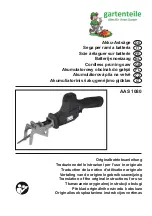
Introduction
7
L
Do not touch the plug with wet hands.
L
The AC adaptor is used as the main
disconnect device. Ensure that the AC
outlet is installed near the unit and is
easily accessible.
Battery
To reduce the risk of fire or injury to
persons, read and follow these
instructions.
L
Use only the battery(ies) specified.
L
Do not dispose of the battery(ies) in a
fire. They may explode. Check with local
waste management codes for special
disposal instructions.
L
Do not open or mutilate the battery(ies).
Released electrolyte is corrosive and
may cause burns or injury to the eyes or
skin. The electrolyte may be toxic if
swallowed.
L
Exercise care when handling the
battery(ies). Do not allow conductive
materials such as rings, bracelets or
keys to touch the battery(ies), otherwise
a short circuit may cause the battery(ies)
and/or the conductive material to
overheat and cause burns.
L
Charge the battery(ies) provided with or
identified for use with this product only in
accordance with the instructions and
limitations specified in this manual.
WARNING:
L
To prevent the risk of fire or electrical
shock, do not expose this product to rain
or any type of moisture.
Medical
L
Consult the manufacturer of any
personal medical devices, such as
pacemakers or hearing aids, to
determine if they are adequately
shielded from external RF (radio
frequency) energy. (The unit operates in
the frequency range of 2.4 GHz to 2.48
GHz, and the power output level can
range from 0.04 to 0.1 watts.) Do not use
the unit in health care facilities if any
regulations posted in the area instruct
you not to do so. Hospitals or health care
facilities may be using equipment that
could be sensitive to external RF (radio
frequency) energy.
Notice
L
Please ensure that a separate
telephone, not dependent on local
power, is available for emergency use.
L
This equipment will be inoperable when
mains power fails.
L
When a failure occurs which results in
the internal parts becoming accessible,
disconnect the power supply cord
immediately and return this unit to an
authorised service centre.
L
To minimise the possibility of lightning
damage, when you know that a
thunderstorm is coming, we recommend
that you:
– Unplug the telephone line cord from
the phone jack.
– Unplug the power supply cord from
the AC power outlet.
L
No “000” or other calls can be made
from this device during a mains power
failure.
L
The earcap on the handset is
magnetised and may retain metallic
objects.
L
This equipment has been tested and
found to comply with AS/NZS 3548:
1995 limits for electromagnetic
interference. Any modifications to any
part of the system or to any peripherals
may void the EMC compliance of the
system or the peripherals.
TG2421AL_2422AL(e).book Page 7 Tuesday, March 15, 2005 6:29 PM








































